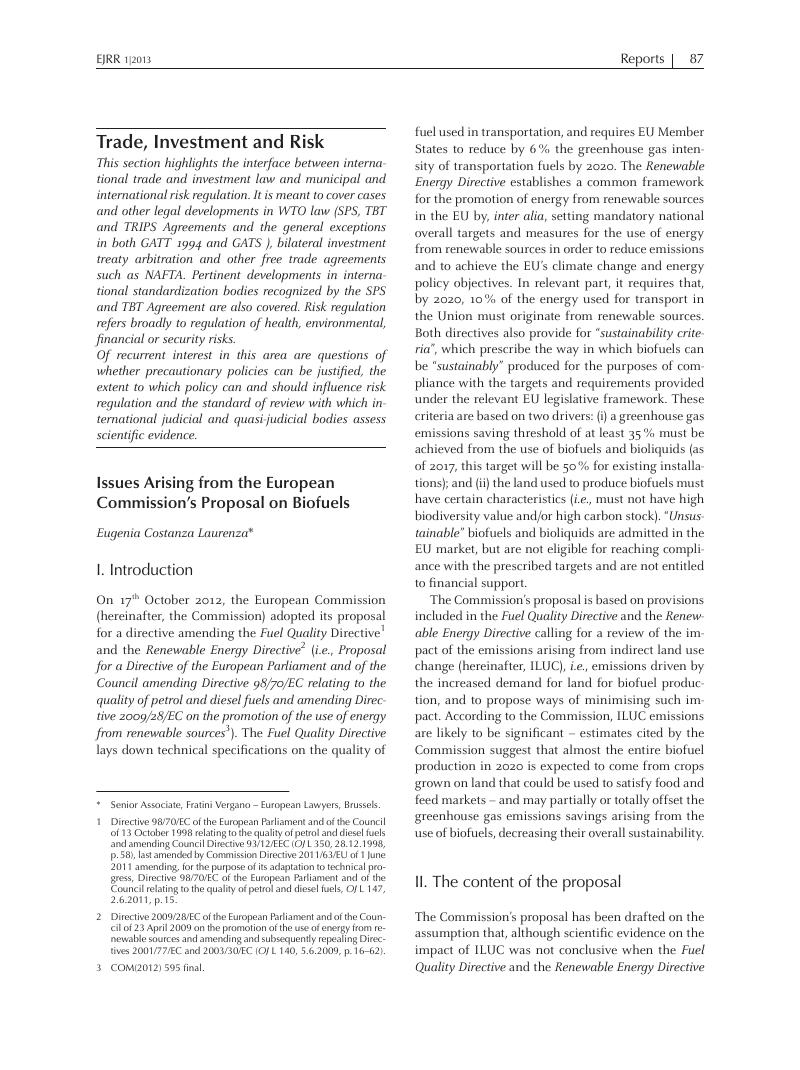No CrossRef data available.
Article contents
Issues Arising from the European Commission's Proposal on Biofuels
Published online by Cambridge University Press: 20 January 2017
Abstract

- Type
- Reports
- Information
- Copyright
- Copyright © Cambridge University Press 2013
References
1 Directive 98/70/EC of the European Parliament and of the Council of 13 October 1998 relating to the quality of petrol and diesel fuels and amending Council Directive 93/12/EEC (OJ L 350, 28.12.1998, p. 58), last amended by Commission Directive 2011/63/EU of 1 June 2011 amending, for the purpose of its adaptation to technical progress, Directive 98/70/EC of the European Parliament and of the Council relating to the quality of petrol and diesel fuels, OJ L 147, 2.6.2011, p. 15.
2 Directive 2009/28/EC of the European Parliament and of the Council of 23 April 2009 on the promotion of the use of energy from renewable sources and amending and subsequently repealing Directives 2001/77/EC and 2003/30/EC (OJ L 140, 5.6.2009, p. 16–62).
3 COM(2012) 595 final.
4 European Communities – Measures Affecting Asbestos and Products Containing Asbestos, Appellate Body Report, WT/DS135/AB/R, adopted 5 April 2001.
5 McGovern, Edmond, International Trade Regulation (Exeter: Globefield Press, 2012), 5.21–3.Google Scholar
6 See, inter alia, panel and Appellate Body reports in Brazil – Measures Affecting Imports of Retreaded Tires for Article XX(b), WT/ DS332; panel and Appellate Body Reports in United States – Import Prohibition of Certain Shrimp and Shrimp Products, WT/DS58 (including the compliance panel and Appellate Body reports under United States – Import Prohibition of Certain Shrimp and Shrimp Products – Article 21.5 – Malaysia); and United States – Standards for Reformulated and Conventional Gasoline, WT/DS2.
7 United States – Import Prohibition of Certain Shrimp and Shrimp products, Appellate Body Report WT/DS58, adopted 6 November 1998, paras. 127 et sqq.
8 United States – Standards for Reformulated and Conventional Gasoline, Panel Report, WT/DS2/R, para. 6.37.
9 There is extensive case law that elaborates on the requirements of the chapeau, namely United States – Standards for Reformulated and Conventional Gasoline, Appellate Body Report, WT/DS2/AB/R, adopted 20 May 1996; and United States – Import Prohibition of Certain Shrimp and Shrimp Products, Appellate Body Report, WT/ DS58/AB/R, adopted 6 November 1996.
10 European Communities – Trade Description of Sardines, Appellate Body Report, WT/DS231/AB/R, adopted 26 September 2002.
11 United States – Measures Concerning the Importation, Marketing and Sale of Tuna and Tuna Products, WT/DS381. The Panel found the measure at stake which established the requirements for use of a “dolphin–safe” label on tuna products, to be “mandatory” within the meaning of the TBT Agreement even if the obligations it laid down were only addressed at operators participating in the market under certain conditions (i.e., trading with products bearing a dolphin– safe label), and still allowed tuna products (without a dolphinsafe label) to be placed on the market. The Appellate Body found that the Panel did not err in its characterisation of the measure as a technical regulation, upholding the Panel's interpretation of the term “mandatory” under the TBT Agreement.




